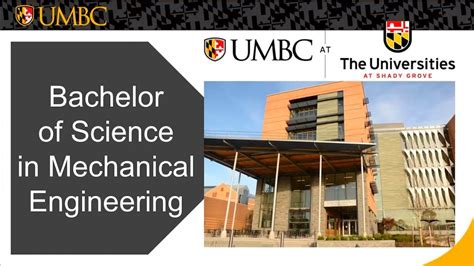UMBC’s Mechanical Engineering program is a nationally recognized leader in educating students and advancing the field of engineering. Known for its rigorous curriculum, cutting-edge research, and industry partnerships, the program empowers graduates to become leaders in a wide range of industries, including aerospace, automotive, robotics, and biomedical engineering.

Curriculum and Faculty
The UMBC Mechanical Engineering curriculum provides students with a comprehensive foundation in the principles of engineering mechanics, thermodynamics, materials science, and fluid dynamics. Students gain hands-on experience through laboratory work, design projects, and internship opportunities.
The faculty at UMBC Mechanical Engineering are dedicated to teaching excellence and research innovation. They include award-winning professors, industry leaders, and nationally recognized researchers. The department’s small class sizes and close faculty-student relationships foster a collaborative and supportive learning environment.
Research and Innovation
UMBC Mechanical Engineering is a major hub for research, with faculty and students engaged in projects that address critical challenges in the field. Some of the department’s research strengths include:
- Advanced Manufacturing and Materials: Developing new materials and manufacturing processes for aerospace, biomedical, and automotive applications.
- Energy and Sustainability: Investigating renewable energy technologies, energy-efficient systems, and sustainable design practices.
- Biomechanics and Medical Devices: Designing and testing medical devices, implants, and prosthetics to improve patient outcomes.
- Robotics and Autonomous Systems: Developing and deploying robots and autonomous systems for various applications, including healthcare, industrial automation, and space exploration.
Industry Partnerships and Career Opportunities
UMBC Mechanical Engineering has strong partnerships with industry leaders, providing students with access to career opportunities, internships, and research collaborations. Top employers of UMBC Mechanical Engineering graduates include:
- Boeing
- Lockheed Martin
- Northrop Grumman
- NASA Goddard Space Flight Center
- Johns Hopkins University Applied Physics Laboratory
Why Choose UMBC Mechanical Engineering?
There are numerous reasons why students choose UMBC Mechanical Engineering, including:
- Rigorous Curriculum and Faculty: The curriculum and faculty are nationally recognized for their excellence and innovation.
- Hands-on Experiences: Students gain valuable hands-on experience through laboratory work, design projects, and internships.
- Research Opportunities: Students have the opportunity to participate in cutting-edge research projects and work alongside experienced faculty.
- Industry Partnerships: The department’s industry partnerships provide students with access to career opportunities and real-world experience.
- Strong Alumni Network: Graduates from UMBC Mechanical Engineering are highly sought after by employers and have a strong alumni network for support and mentorship.
Common Mistakes to Avoid
Students pursuing Mechanical Engineering at UMBC should avoid the following common mistakes:
- Underestimating the Rigor: While the program is rewarding, it requires hard work and dedication to succeed.
- Not Taking Advantage of Opportunities: Internships, research experiences, and extracurricular activities can greatly enhance the educational experience and career prospects.
- Ignoring Teamwork: Mechanical Engineering often involves working in teams. Students should develop strong communication and collaboration skills.
- Choosing the Wrong Elective Courses: Carefully select elective courses to complement the core curriculum and expand knowledge in areas of interest.
- Not Seeking Help When Needed: Faculty and academic support staff are available to help students succeed. Don’t hesitate to seek assistance when needed.
Pros and Cons of UMBC Mechanical Engineering
Pros:
- Renowned curriculum and faculty
- Hands-on experiences and research opportunities
- Strong industry partnerships and career support
- Small class sizes and supportive environment
- Located in a vibrant and innovative research corridor
Cons:
- Rigorous academic program requires hard work and dedication
- Limited scholarship availability compared to some other universities
- Parking can be limited during peak hours
- Some students may prefer a larger university environment
- Not all engineering disciplines are offered (e.g., nuclear engineering)
Applications of Mechanical Engineering
The versatility of Mechanical Engineering opens up numerous applications across various industries. Here are some innovative and emerging applications:
- Bioprinting: 3D printing technologies are being used to create living tissue and organs for medical and research applications.
- Nanotechnology: Engineers are designing and manufacturing materials and devices at the nanoscale, with applications in medicine, electronics, and energy.
- Renewable Energy: Mechanical engineers play a vital role in developing and deploying renewable energy technologies, such as solar and wind power systems.
- Quantum Computing: The field of quantum computing, which utilizes quantum mechanics for computation, has the potential to revolutionize industries such as drug discovery and materials science.
- Personalized Medicine: Engineers are working on developing personalized medical devices and treatments tailored to individual patients’ needs.
Conclusion
UMBC’s Mechanical Engineering program is an excellent choice for students seeking a top-notch education in the field. With its rigorous curriculum, cutting-edge research, and industry partnerships, the program prepares graduates to become leaders in the engineering profession and contribute to the advancement of technology and innovation.
